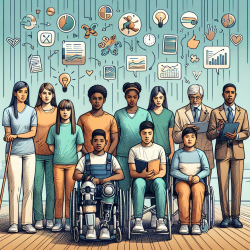Empowering Practitioners: Enhancing Mental Health Outcomes for Transition-Aged Youth with Physical Disabilities

The transition to adulthood is a critical period for youth with physical disabilities, marked by numerous challenges that can significantly impact their mental health. Recent research titled "Mental health problems among transition-aged youth with physical disabilities: an initial evaluation" provides valuable insights that practitioners can leverage to improve outcomes for this vulnerable population.The study utilized the Behavior Assessment System for Children-Third Edition (BASC-3) to measure mental health issues among youth aged 14-25 with physical disabilities. Key findings revealed that "somatization," "self-esteem," "depression," and "sense of inadequacy" were the most common mental health challenges faced by these individuals. Notably, youth with a higher number of functional issues were more likely to fall within "at risk" or "clinically significant" categories across multiple BASC-3 scales.To better serve transition-aged youth with physical disabilities, practitioners should consider the following data-driven strategies:
- Comprehensive Assessment: Utilize tools like the BASC-3 to conduct thorough assessments that cover a wide range of mental health aspects, including emotional and behavioral issues. This ensures a holistic understanding of each youth's mental health status.
- Focus on Functional Issues: Pay close attention to the number of functional issues a youth experiences. The study found a significant association between higher functional issues and increased mental health risks. Tailoring interventions to address these functional challenges can mitigate mental health problems.
- Gender-Sensitive Approaches: Female participants in the study were more likely to fall within "at risk" or "clinically significant" categories for several mental health scales. Practitioners should adopt gender-sensitive approaches to better support female youth with physical disabilities.
- Early Intervention: Younger participants (<20 years) were more likely to exhibit mental health issues. Early intervention can prevent the escalation of these problems. Programs aimed at increasing participation in meaningful activities can significantly improve mental health outcomes.
- Participation-Focused Interventions: Increasing participation in community and leisure activities has been shown to improve mental health. Encourage youth to engage in activities that interest them, as this can enhance their overall well-being and reduce mental health issues.
Incorporating these strategies into practice can help practitioners create better mental health outcomes for transition-aged youth with physical disabilities. The findings underscore the importance of a comprehensive, data-driven approach to address the unique challenges faced by this population.To read the original research paper, please follow this link:
Mental health problems among transition-aged youth with physical disabilities: an initial evaluation.
Citation: Amalfi, A., Li, J. Y., Théberge-Lamoureux, V., Tang, C., Rinaldi, E., Khayargoli, P., & Anaby, D. (2023). Mental health problems among transition-aged youth with physical disabilities: an initial evaluation. Frontiers in Rehabilitation Sciences, 4, 1069464. https://doi.org/10.3389/fresc.2023.1069464










